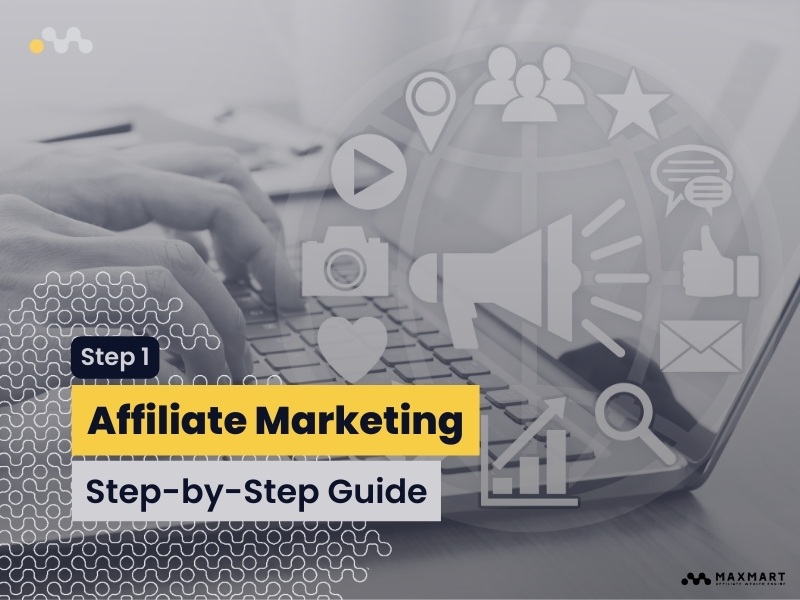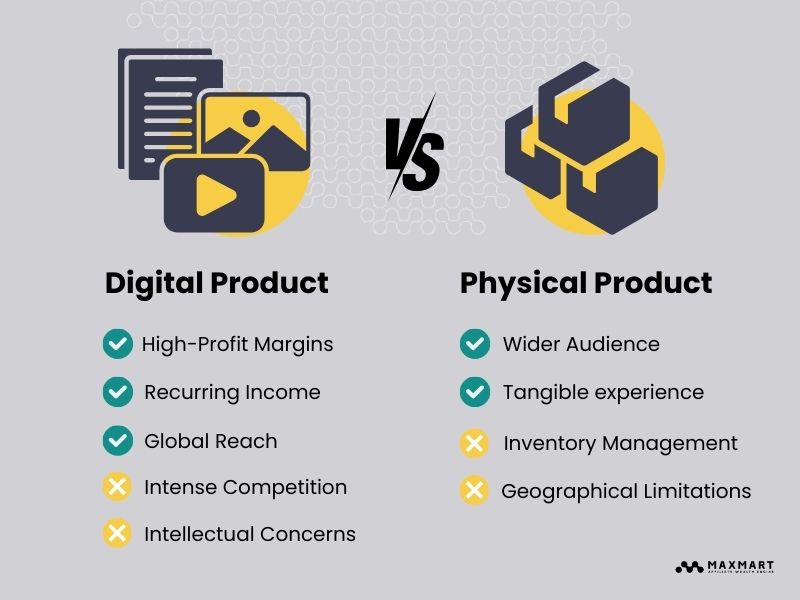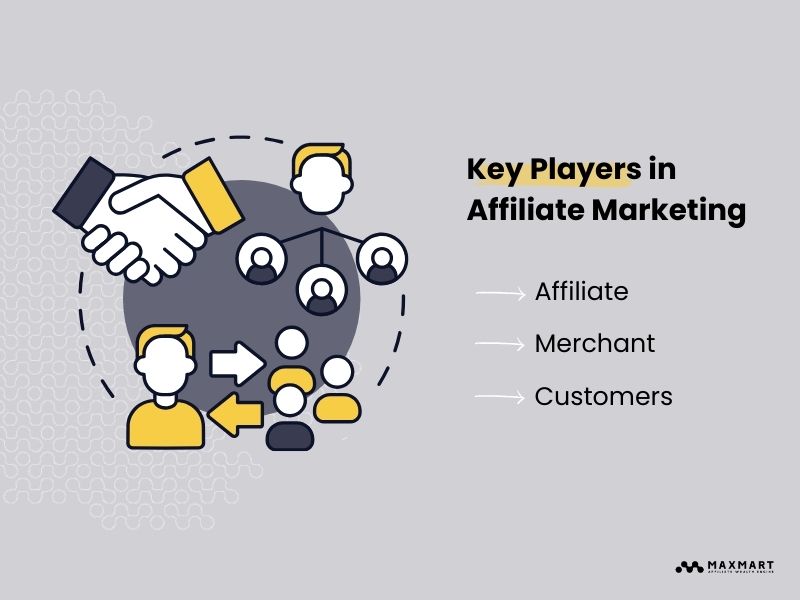
Have you ever dreamt of earning income while you sleep? The prospect of passive income – money that flows in without constant effort – is undeniable. This blog post dives deep into the world of affiliate marketing, a powerful strategy that unlocks that dream and transforms your passions into profit.
Affiliate marketing offers an easy–to-start approach with high earning potential. We’ll guide you through everything you need to know, uncovering the secrets to success and equipping you with the tools to launch your affiliate marketing journey with confidence.
Whether you’re a seasoned blogger, a social media enthusiast, or simply looking for a new way to monetize your hobbies, affiliate marketing offers an exciting and rewarding opportunity. This blog post is your roadmap to success – let’s embark on this journey together and turn your passions into a thriving affiliate marketing business!
MaxMart is your partner in this exciting venture. We understand that navigating the world of affiliate marketing can be confusing at first. That’s why we’ve packed this guide with actionable steps and valuable insights. With MaxMart by your side, you’ll gain access to a vast network of products, expert support, and ongoing resources to help you build a thriving affiliate marketing business.

Passive income
Imagine a world where you can earn money consistently without needing to constantly clock in. That’s the magic of passive income, a steady stream of earnings that requires little to no ongoing effort to maintain. Intrigued? Let’s dive into what passive income is.
What is Passive Income?
In contrast to the paycheck you receive for your regular job (active income), passive income is money you earn with minimal effort. It’s like planting a seed that continues to grow and yield fruit over time. There’s usually an upfront investment of time, money, or creativity, but once the system is in place, it runs largely on autopilot.
What is Online Passive Income?
Online passive income refers to money you can earn without too much ongoing effort, primarily through digital channels.
Many methods exist for creating online passive income, but affiliate marketing is widely considered one of the most accessible and rewarding. This is where MaxMart comes in!
Throughout this guide, we’ll not only delve deeper into affiliate marketing but also equip you with the knowledge and resources to jumpstart your own online passive income journey. We’ll cover everything from setting things up to answering the questions you might have along the way.
What is Affiliate Marketing?
Have you ever enthusiastically recommended a product to a friend? Affiliate marketing is a way to turn those recommendations into earnings! This is how affiliate marketing works:
- A company makes a product.
- You (the affiliate) like the product and tell people about it, recommending it to your friends, followers, or website visitors.
- You have a special link that tracks who clicks on it.
- If someone clicks your link and completes the desired action (whether buying, signing up for a newsletter, or…), the company gives you a commission (a share of the money).
So, you get rewarded for spreading the word about things you like! It’s a way for companies to find new customers, and for you to earn money by sharing things you find valuable.
Is Affiliate Marketing Legit?
Affiliate marketing lets you earn commissions by recommending other companies’ products or services. You get paid when people click your special link and make a purchase.
It’s a legitimate way to make money, but it’s important to follow the rules. You should also be transparent with your audience and only promote products you genuinely like.
Many well-known brands offer affiliate programs, allowing you to earn commissions on sales you generate. Just to mention a few examples:
- In the digital realm, both ExpressVPN, a leading privacy and security service, and Avast, a renowned antivirus software company, have affiliate programs.
- For those looking to promote physical products, giants like Nike and Adidas offer affiliate programs, letting you share your passion for sportswear and footwear while earning a commission.
Is Affiliate Marketing Worth It?
The answer depends on your dedication and chosen niche. Affiliate marketing isn’t a “get rich quick” scheme. It requires effort, strategic planning, and audience building. However, the potential rewards are significant. Successful affiliates can earn substantial commissions, and the beauty lies in the scalability. Once your content is created, it can continue to generate income for a long time.
Also, there’s a goldmine hiding in plain sight: your digital marketing assets! As you cultivate a loyal audience around your niche, all your efforts – from social media followings to email lists and engaging blog content – transform into valuable possessions.
Even if affiliate marketing doesn’t bring the desired results, these cultivated communities and content hold value. Platforms like Flippa allow you to sell these digital assets – your website, social media pages, and email lists – for a good price. In essence, your marketing efforts are never wasted, they can always transform into profit down the line.
Digital Products vs. Physical Products in Affiliate Marketing

Now that you’re excited about affiliate marketing, a crucial decision awaits: choosing between promoting digital or physical products. Both offer advantages and disadvantages, and the best choice depends on your goals and audience. Here’s a breakdown to help you make an informed decision:
- Digital Products: Ebooks, online courses, software, or apps offer high profit margins as there’s no physical inventory to manage.
- Subscription-based products can give you recurring income. This means you can earn a commission every time a customer renews their subscription, providing a steady stream of income.
- The competition might be fierce in the digital space due to the ease of creating and selling digital products.
- Physical Products: The sheer variety of options allows you to cater to a wider audience.
- Limited to your location (depending on the affiliate program). Some affiliate programs may have restrictions on where you can promote their products. Be sure to check the program’s terms and conditions before you start promoting.
While both digital and physical products have their merits, digital products offer a compelling case for beginners or those seeking more flexibility. The lack of inventory management, instant delivery, and potential for recurring commissions create a streamlined experience. While commission rates might be lower, the ease of promotion and a wider variety of products can help offset this.
Ultimately, the reduced limitations associated with digital products make them a strong contender, especially for those starting their affiliate marketing journey.
Why Not Promote My Product?
Affiliate marketing offers a unique path to earning income by promoting other companies’ products, whether they’re physical items or digital products. This approach unlocks several advantages:
- Lower Barrier to Entry: Forget the upfront costs of product development, manufacturing, and customer service. With affiliate marketing, you focus on promotion, leaving the product creation to the brand.
- Wider Range of Products: Promote things you’re truly passionate about! There’s a vast selection of products out there, from physical fitness equipment to language learning software. You can choose products that align with your interests and target audience.
In essence, affiliate marketing provides a low-risk, flexible way to tap into the world of online sales. You can leverage your marketing skills and knowledge to build an audience and earn commissions without the burden of creating your own physical or digital products.
Key Players in Affiliate Marketing

Affiliate marketing does involve a few key roles that contribute to the overall process:
- Affiliate (You): As the affiliate marketer, you’re the one promoting products or services from other companies. You create content, build an audience, and strategically place affiliate links within that content. When someone clicks your link and makes a purchase, you earn a commission.
- Merchant: This is the company that creates and sells the product or service you’re promoting. They offer affiliate programs that provide you with marketing materials, unique tracking links, and a commission structure.
- Customers: Customers are the lifeblood of the process. They reach the merchant’s website through affiliate links and their actions, like purchases or specific tasks.
AI: Your Ideal Affiliate Marketing Partner

The world of affiliate marketing is constantly evolving, and AI (Artificial Intelligence) is quickly becoming a game-changer. These intelligent tools can streamline your workflow, boost efficiency, and ultimately help you generate more sales.
Get ready to supercharge your affiliate marketing with the magic of AI! Here’s how these intelligent tools can become your secret weapon:
- Market Research on Autopilot: Gone are the days of tedious manual research. AI tools can analyze vast amounts of data to identify trending products, understand your target audience’s interests, and discover profitable niches. This allows you to make informed decisions about which products to promote and tailor your content accordingly.
- Data-Driven Decisions, Maximum Impact: AI crunches numbers like nobody’s business. These tools can analyze your website traffic, social media engagement, and conversion rates to pinpoint what’s working and what’s not. This data-driven approach allows you to optimize your campaigns for maximum impact and continuously refine your strategies for better results.
- Content Creation Made Easy: AI can’t replace your unique voice, but it can certainly be your muse. AI writing assistants can help you generate engaging blog posts, product descriptions, and social media captions, saving you precious time. Plus, some tools offer built-in plagiarism checks, ensuring your content is original and shines with your personality.
- Personalized Recommendations for Higher Conversions: AI can analyze your audience’s interactions with your content to understand their preferences. This allows you to recommend products that are highly relevant to their interests, leading to a more personalized experience and ultimately, higher conversion rates.
By embracing AI tools, you can unlock a wealth of capabilities that will elevate your affiliate marketing game. Remember, AI is there to empower you, not replace you. Use it to free up your time for creative endeavors and strategic planning, while letting AI handle the heavy lifting when it comes to data analysis and content creation.
How to Start Affiliate Marketing in 4 Easy Steps
We’ve explored the core concepts, and now it’s time to put that knowledge into action. Maxmart will guide you through the essential steps to becoming a successful affiliate marketer. So, buckle up and get ready to transform your passion into profits!
1. Affiliate Niche: Finding Your Affiliate Marketing Sweet Spot
Ever felt overwhelmed by the vast ocean of “stuff” you could potentially promote as an affiliate marketer? That’s where niching down comes in! Your affiliate niche is your chosen territory within the affiliate marketing landscape.
In affiliate marketing, your niche is the specific market segment you choose to target. It’s a focused area within a broader industry that allows you to cater to a well-defined audience with specific needs and interests. Think of it like a slice of pie – the entire pie might be “health and wellness,” but your niche could be “plant-based protein supplements for athletes.”
Selecting the right affiliate niche isn’t just about picking a topic. It’s the foundation of your entire strategy. A well-chosen niche directly impacts your ranking power in search results for related keywords.
Different niches also have varying levels of profitability. A well-chosen niche, with a targeted audience and strong affiliate programs, can lead to higher commissions and sales.
2. Affiliate Programs and Networks: Finding Your Perfect Match
Affiliate marketing thrives on partnerships. Before you jump in and promote everything under the sun, it’s crucial to select the right affiliate programs and networks to collaborate with. Let’s break down the difference between the two:
- Affiliate Program: An affiliate program is essentially a marketing agreement directly between a merchant (the brand selling a product or service) and an affiliate (the marketer promoting the product or service). The affiliate promotes the merchant’s offerings through unique tracking links and earns a commission for every sale or conversion generated through those links.
- Affiliate Network: An affiliate network acts as a matchmaker, connecting merchants with potential affiliates. Networks house a vast pool of affiliate programs across various industries. Affiliates can browse these programs, find products that align with their audience’s interests, and sign up to promote them. Networks handle much of the administrative work, including tracking sales, managing commissions, and providing reporting tools.
Regardless of your choice, focus on reputable affiliate programs and networks with clear commission structures and easy-to-use platforms. This research lays the foundation for your success. With careful planning and execution, affiliate marketing can be a powerful tool to fuel your income and entrepreneurial dreams.
3. Driving Traffic for Affiliate Marketing: Attracting Your Audience
In affiliate marketing, traffic refers to the flow of visitors to your website, social media pages, or wherever you’re promoting your affiliate links. The more targeted traffic you have, the more potential customers you’ll reach and the higher your chances of conversions (sales or clicks through your links).
There are two main ways to generate traffic:
- Organic Traffic: This refers to visitors who find your content naturally, without any paid advertising. This can be achieved through search engine optimization (SEO), content marketing, and building an audience on social media (Instagram, Facebook, Instagram, and Pinterest).
- Paid Traffic: This involves paying for advertising platforms to show your content to a specific audience. Popular options include pay-per-click (PPC) advertising on search engines and social media platforms.
4. Optimizing Performance and Conversion Through Tracking
You’ve crafted compelling content, and driven traffic to your offers. But how do you know what’s working and what’s not? This is where tracking and optimization become your secret weapons.
Tracking simply means collecting data on how your affiliate marketing campaigns are performing. Imagine running a blindfolded race – you wouldn’t know if you’re headed in the right direction! Tracking allows you to see what’s converting into sales and what’s falling flat.
Here’s where KPIs (Key Performance Indicators) come in. These are specific metrics that tell you how well your affiliate marketing efforts are achieving your goals. A common KPI in affiliate marketing is the conversion rate. This is the percentage of visitors linked to merchants who make a desired action like buying.
By continuously tracking and optimizing your KPIs, you can maximize your affiliate marketing ROI (Return on Investment).
Start Your Affiliate Marketing Journey with MaxMart
The world of affiliate marketing is exciting and full of potential. By leveraging this strategy, you can turn your passions into a source of online passive income. As you’ve seen, getting started is a straightforward process that can be broken down into just four key steps.
MaxMart is dedicated to empowering you on your affiliate marketing journey. We provide a step-by-step approach that equips you with the knowledge and tools you need to succeed.
This tutorial has offered a foundational understanding of affiliate marketing. To delve deeper into each step and explore the essential tools you’ll need, be sure to check out our next series of articles. We’ll guide you through selecting a niche, finding the perfect affiliate programs, crafting compelling content, and strategically using affiliate links.

